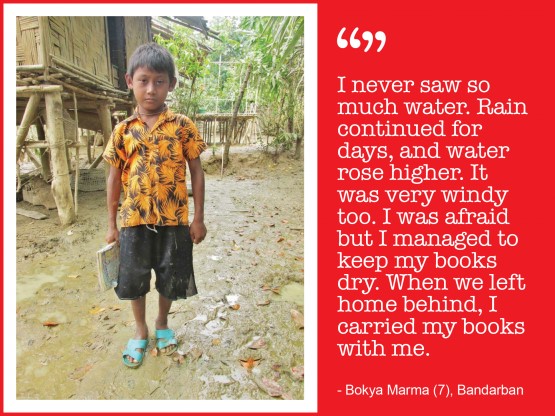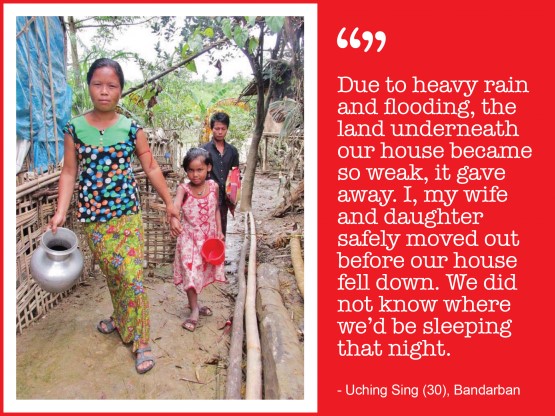

It all started with light showers. But the drizzle escalated to downpour in Thanchi and around. This led to flooding in this hilly terrain of Bandarban district – something most of the inhabitants there never experienced. By the time water started to recede after 4 days of heavy rain, the hilly land mass already lost its stability. Several landslides followed affecting people’s houses and roads. And the flooding took away crops and seedbeds.
But it was far from being over. An additional series of events continued to rattle Thanchi.
Mid July, a deep depression in the Bay of Bengal caused further downpour submerging the communities for the second time. Water started to recede in a few days but the depression developed into a cyclonic storm and passed by Thanchi in the wee hours on 31 July. The storm, weakened upon landfall, was strong enough to trigger more landslides, which – together with a few cases of electrocution and drowning – claimed at least 29 lives. As communications fell, the district became disconnected from the rest of the country.
Local Government authority opened up 3 flood shelters in Thanchi and provided 10 kilogram of rice to the families taking shelter there. When the rain stopped on August 1, people started to return home or whatever was left of it.
ActionAid Bangladesh’s humanitarian team attempted to reach the affected areas but had to return: the road was cut off in at least 3 locations. The needs assessment task the team was entrusted with had to be routed to BNKS – our partner organisation in Thanchi. A few teams formed with women from the affected communities started the needs assessment process. They met the children and the families affected by the chain of disasters and continued gathering facts and figures on loss and damage.

Upon second attempt a few days after, ActionAid Bangladesh team succeeded in reaching Thanchi and shared with the community about how best to run the needs assessment while building the community’s resilience and also, more importantly, building on it. We learnt from working in the most disaster-prone coastal region that in responding to emergencies such as this, women of the communities leading the response brings better results. The learning was applied here.
Led by women of the communities, the assessment teams consulted the community people and shared about their needs in a report that also made reference to how much the community can put in into the recovery work.
In the Thanchi communities we work in, 6 families have lost houses. 10 more homes were damaged partially. Three of the facilities for the children called ‘child spaces’ have fallen down. A total of 366 families have lost their crops and fruit trees. Orchards of 99 families are damaged.

As this is monsoon, the families that lost shelter are in need of immediate support. We have started working with the partner organisation and people in the affected communities to build and repair the fallen houses and also install latrines.
The families in Thanchi depend mostly on crop yield for almost 7 months a year. Our estimates show that at least 366 families are likely to go hungry for the coming 4-5 months. This calls for unconditional cash vouchers. Thankfully, the local market is still operational. We have started handing out cash vouchers to boost people’s spending capacity – to buy food till their source of livelihood is restored. For that to happen, we are to handout more cash vouchers to encourage people in making small investments in line with their skills and community needs.
As of now, ActionAid is the only NGO extending humanitarian support in Thanchi. Led by 15 women of the communities, this emergency support work will continue for 2 months. Then we will reassess community situation and, if required, take up more humanitarian intervention with community people taking the lead.
Knowing how the changing climate is affecting lives is one thing, and having to convince people that climate change is real is another. Just imagine how proper it would be if Bokya or Uching were asked to prove climate change is happening after all.